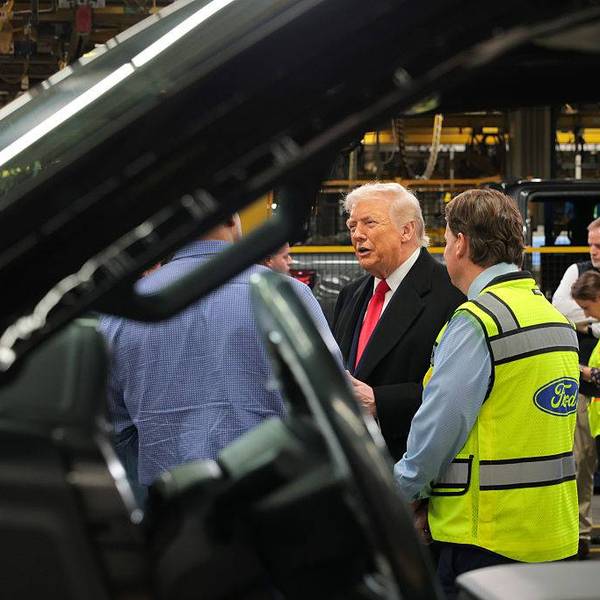
Retired members of the United Auto Workers (UAW) listen to details of their retirement accounts while they attend a monthly benefits meeting at the UAW Local 22 meeting Hall on November 20, 2008 in Detroit, Michigan.
UAW Fails to Win Back Pension Plans for Newer Workers
Amid other impressive gains, this one got away. But organized labor must keep up the fight for defined pension benefits.
The UAW strike against Big Auto succeeded in winning impressive wage gains, but it failed to obtain a little-reported demand: that the auto companies reinstate defined benefit pension plans for new employees that had been suspended as a concession during the 2008 Great Recession.
Instead, as a consolation prize the auto companies offered and the unions took larger company payments to employee 401(k) plans.
This was a significant loss for newer workers who were not grandfathered into the preexisting pension plans. They will receive employer contributions that will rise to ten percent of salary. While that is significantly higher than what most 401(k) plan participants receive from their employers, it will fall far short of what would be needed to provide retirement income equivalent to that of a pension plan. That would require contributions of 25 to 30 percent of salary. Put differently, they will receive one-third to one-half of what workers with equivalent careers received from pension plans.
Pension plans also produce more income because they minimize drainage of fees and profit-taking to the financial services industry which gains much more from managing 401(k) plans.
Defined benefit pension plans produce much more income for retirees because they incorporate risk sharing among participants while 401(k)s shift all the risks to individuals. If the market tanks, it’s the employer’s problem with pension plans, the worker’s problem with 401(k)s. Pension plans guarantee set amounts of life income according to sizes of employee salaries and lengths of time worked. 401(k) retirement incomes depend on sizes of accumulated individual investments. These in turn depend on amounts invested and the skill or luck of the investors.
Pension plans also produce more income because they minimize drainage of fees and profit-taking to the financial services industry which gains much more from managing 401(k) plans.
Many people have been led to believe by the financial services industry and conservative think tanks that pension plans are old fashioned, impractical, and unsustainable. This is simply not true. The country has over 50,000 healthy pension plans covering over 60 million active and retired workers. Most public employees have pension plans. And, the largest source of retirement income for most retirees comes from a pension plan: Social Security.
Private employers don’t like pension plans because they don’t want the responsibility and risk involved in sponsoring them. Yet, if an employer is worried about providing adequate retirement income for his workers, it is much cheaper to do so by investing in a pension plan than by providing enough payments to 401(k) accounts. A dollar invested in a pension plan will produce far more retirement income than one contributed to a 401(k).
Private employers don’t like pension plans because they don’t want the responsibility and risk involved in sponsoring them.
It was a victory that the UAW raised the demand to allow newer workers into the pension plans. It challenged the belief that the loss of pension plans was irreversible with 401(k)s being the only alternative. The UAW should not abandon that demand for future contract negotiations.
In the meantime, UAW workers should hold onto their 401(k) accumulations with the hope that in the future they can be rolled into a pension plan for credit for time worked. That is all possible actuarily and there are precedents for it.
An Urgent Message From Our Co-Founder
Dear Common Dreams reader, The U.S. is on a fast track to authoritarianism like nothing I've ever seen. Meanwhile, corporate news outlets are utterly capitulating to Trump, twisting their coverage to avoid drawing his ire while lining up to stuff cash in his pockets. That's why I believe that Common Dreams is doing the best and most consequential reporting that we've ever done. Our small but mighty team is a progressive reporting powerhouse, covering the news every day that the corporate media never will. Our mission has always been simple: To inform. To inspire. And to ignite change for the common good. Now here's the key piece that I want all our readers to understand: None of this would be possible without your financial support. That's not just some fundraising cliche. It's the absolute and literal truth. We don't accept corporate advertising and never will. We don't have a paywall because we don't think people should be blocked from critical news based on their ability to pay. Everything we do is funded by the donations of readers like you. Will you donate now to help power the nonprofit, independent reporting of Common Dreams? Thank you for being a vital member of our community. Together, we can keep independent journalism alive when it’s needed most. - Craig Brown, Co-founder |
James W. Russell is the author of The Labor Guide to Retirement Plans (Monthly Review Press).
The UAW strike against Big Auto succeeded in winning impressive wage gains, but it failed to obtain a little-reported demand: that the auto companies reinstate defined benefit pension plans for new employees that had been suspended as a concession during the 2008 Great Recession.
Instead, as a consolation prize the auto companies offered and the unions took larger company payments to employee 401(k) plans.
This was a significant loss for newer workers who were not grandfathered into the preexisting pension plans. They will receive employer contributions that will rise to ten percent of salary. While that is significantly higher than what most 401(k) plan participants receive from their employers, it will fall far short of what would be needed to provide retirement income equivalent to that of a pension plan. That would require contributions of 25 to 30 percent of salary. Put differently, they will receive one-third to one-half of what workers with equivalent careers received from pension plans.
Pension plans also produce more income because they minimize drainage of fees and profit-taking to the financial services industry which gains much more from managing 401(k) plans.
Defined benefit pension plans produce much more income for retirees because they incorporate risk sharing among participants while 401(k)s shift all the risks to individuals. If the market tanks, it’s the employer’s problem with pension plans, the worker’s problem with 401(k)s. Pension plans guarantee set amounts of life income according to sizes of employee salaries and lengths of time worked. 401(k) retirement incomes depend on sizes of accumulated individual investments. These in turn depend on amounts invested and the skill or luck of the investors.
Pension plans also produce more income because they minimize drainage of fees and profit-taking to the financial services industry which gains much more from managing 401(k) plans.
Many people have been led to believe by the financial services industry and conservative think tanks that pension plans are old fashioned, impractical, and unsustainable. This is simply not true. The country has over 50,000 healthy pension plans covering over 60 million active and retired workers. Most public employees have pension plans. And, the largest source of retirement income for most retirees comes from a pension plan: Social Security.
Private employers don’t like pension plans because they don’t want the responsibility and risk involved in sponsoring them. Yet, if an employer is worried about providing adequate retirement income for his workers, it is much cheaper to do so by investing in a pension plan than by providing enough payments to 401(k) accounts. A dollar invested in a pension plan will produce far more retirement income than one contributed to a 401(k).
Private employers don’t like pension plans because they don’t want the responsibility and risk involved in sponsoring them.
It was a victory that the UAW raised the demand to allow newer workers into the pension plans. It challenged the belief that the loss of pension plans was irreversible with 401(k)s being the only alternative. The UAW should not abandon that demand for future contract negotiations.
In the meantime, UAW workers should hold onto their 401(k) accumulations with the hope that in the future they can be rolled into a pension plan for credit for time worked. That is all possible actuarily and there are precedents for it.
James W. Russell is the author of The Labor Guide to Retirement Plans (Monthly Review Press).
The UAW strike against Big Auto succeeded in winning impressive wage gains, but it failed to obtain a little-reported demand: that the auto companies reinstate defined benefit pension plans for new employees that had been suspended as a concession during the 2008 Great Recession.
Instead, as a consolation prize the auto companies offered and the unions took larger company payments to employee 401(k) plans.
This was a significant loss for newer workers who were not grandfathered into the preexisting pension plans. They will receive employer contributions that will rise to ten percent of salary. While that is significantly higher than what most 401(k) plan participants receive from their employers, it will fall far short of what would be needed to provide retirement income equivalent to that of a pension plan. That would require contributions of 25 to 30 percent of salary. Put differently, they will receive one-third to one-half of what workers with equivalent careers received from pension plans.
Pension plans also produce more income because they minimize drainage of fees and profit-taking to the financial services industry which gains much more from managing 401(k) plans.
Defined benefit pension plans produce much more income for retirees because they incorporate risk sharing among participants while 401(k)s shift all the risks to individuals. If the market tanks, it’s the employer’s problem with pension plans, the worker’s problem with 401(k)s. Pension plans guarantee set amounts of life income according to sizes of employee salaries and lengths of time worked. 401(k) retirement incomes depend on sizes of accumulated individual investments. These in turn depend on amounts invested and the skill or luck of the investors.
Pension plans also produce more income because they minimize drainage of fees and profit-taking to the financial services industry which gains much more from managing 401(k) plans.
Many people have been led to believe by the financial services industry and conservative think tanks that pension plans are old fashioned, impractical, and unsustainable. This is simply not true. The country has over 50,000 healthy pension plans covering over 60 million active and retired workers. Most public employees have pension plans. And, the largest source of retirement income for most retirees comes from a pension plan: Social Security.
Private employers don’t like pension plans because they don’t want the responsibility and risk involved in sponsoring them. Yet, if an employer is worried about providing adequate retirement income for his workers, it is much cheaper to do so by investing in a pension plan than by providing enough payments to 401(k) accounts. A dollar invested in a pension plan will produce far more retirement income than one contributed to a 401(k).
Private employers don’t like pension plans because they don’t want the responsibility and risk involved in sponsoring them.
It was a victory that the UAW raised the demand to allow newer workers into the pension plans. It challenged the belief that the loss of pension plans was irreversible with 401(k)s being the only alternative. The UAW should not abandon that demand for future contract negotiations.
In the meantime, UAW workers should hold onto their 401(k) accumulations with the hope that in the future they can be rolled into a pension plan for credit for time worked. That is all possible actuarily and there are precedents for it.

